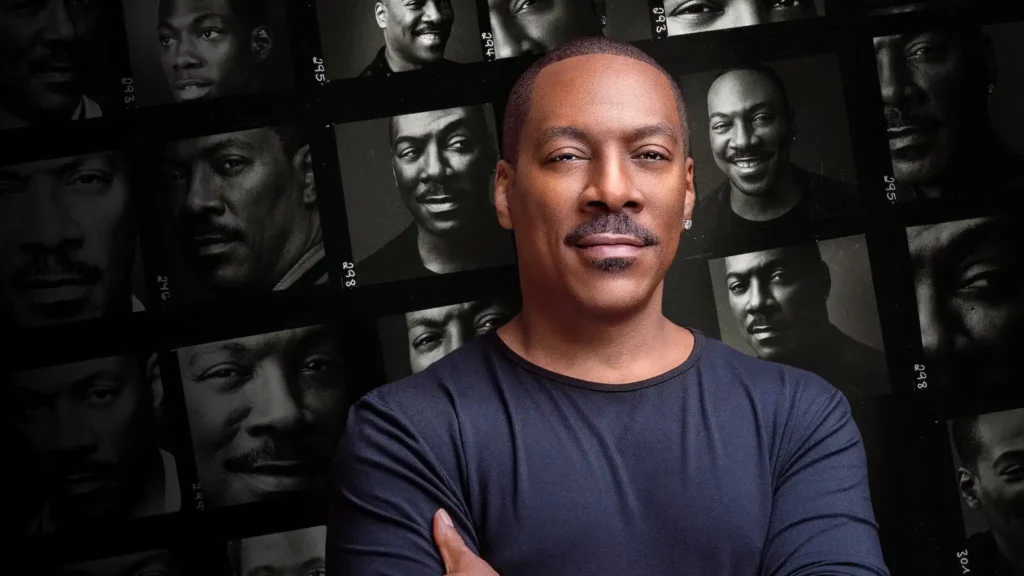
Eddie Murphy is a legend, there’s no doubt about that. His contributions to entertainment through landmark stand-up comedy specials and mainstream movies undeniably changed the world, and the careers of many household names wouldn’t have been possible without the trail he blazed through ‘80s and ‘90s pop culture. But Angus Wall’s sycophantic Netflix feature Being Eddie has no purpose beyond reminding us of this, conveniently in the midst of its subject’s career-rejuvenating multi-million dollar deal with the streamer. It’s a feature-length PR puff piece that, after a while, becomes deeply uncomfortable in its incessant self-congratulatory backslapping.
This, coming just two days after Marines turned out to be a pretty shameless way to drum up Marine Corps enlistment, feels icky. And it’s weirder in this case because Eddie Murphy’s career is deserving of the praise. He’s an icon. But there’s something odd about being told that repeatedly, especially when it’s coming from the icon himself. Being Eddie includes a bunch of talking heads, including Dave Chappelle, Chris Rock, Kevin Hart, and Arsenio Hall, but the person we hear the most from is Eddie Murphy, explaining at length why he’s so important, talented, and special.
He’s right – but do we want to hear it from the horse’s mouth? That said, I’m not sure we want to hear it from his inner circle either. At one point, Chappelle says that if he’s comedy’s LeBron James, Eddie was the Michael Jordan poster on his bedroom wall. It’s a comparison I’d make without reservation, but that’s not the point. It’s eerie to hear someone – anyone – say that about themselves. Comparisons to all-time-great legends aren’t accidental; they’re intended to subliminally reinforce an idea. The whole movie is like that. And in being that way, it neatly sidesteps everything that might be contentious or challenging about Murphy’s career, especially when it’s considered in hindsight. Justifiable criticism of how his early work has aged – especially in the context of Netflix having assured his return to stand-up for the first time since 1987’s Raw – is avoided entirely, and his run of commercial failures is recontextualised as a positive at best or, at worst, as a way to court sympathy, with a fairly big deal being made of David Spade’s famous falling star comment shortly after the release of the woeful Vampire in Brooklyn.

Murphy is notoriously private, which annoyingly bleeds into a documentary marketed as a deeply personal tell-all. The contradiction is unavoidable and eventually starts to feel actively disingenuous, especially when illuminating aspects of Murphy’s early life – the hostile relationship between his parents, the murder of his father, a manifestation of OCD as a child that saw him habitually checking the gas had been turned off before going to bed – are brought up but left entirely unexamined. Murphy’s claim that he “forced himself” to stop being mentally ill is left unchallenged. His aversion to smoking, drinking, and taking drugs is mentioned; getting stopped by the police in 1997 with trans sex worker Atisone Seiuli in his car is, predictably, not.
You get the idea. And I know what you’re thinking. Why would Eddie Murphy want this kind of thing dragged back to the forefront of the public consciousness when he’s undergoing a career renaissance? He wouldn’t. Which brings us to perhaps the more important question of why Netflix would commission a documentary about him if this is the case. There’s only one answer to that – shameless self-promotion, an extended effort to shape the image of Eddie Murphy into something as saleable now as it was in the ‘80s and ‘90s, with no acknowledgement of how times have changed in the interim. Netflix is, in essence, telling us what to think, hence constant allusions to Murphy’s devotion to being a family man, despite Being Eddie itself sparing much more time for big-ticket names like Chappelle and feeling oddly sterile on the family front. Predictably, there are no mentions of that public paternity scandal either.
The clear upside of Being Eddie is that Murphy’s career is legitimately iconic and fascinating. His stand-up work in Delirious and Raw dissuaded the public of the notion that culture only needed one Black comedian; he refused to be pitted against Richard Pryor – even directing him in 1989’s Harlem Nights – and openly called out racist double-standards in the industry, on late-night talk shows, and at the Oscars. He still never won one of the latter, despite starring in all kinds of great movies and disappearing into transformative make-up and practical effects work while playing multiple different characters at once.
The irony is that the root of Murphy’s unprecedented success is a big part of the reason why a movie about his career isn’t all that interesting. The theme emerges early. Murphy never fell for the trappings of celebrity because he was too vain. “I love myself, and I knew what I wanted to do,” he says at one point, by way of explanation. It’s difficult to argue with, since the primary takeaway from a supposedly comprehensive and intimate exploration of his life is that he does indeed love himself. That so many other people love him too is the only reason a documentary like this exists, and why it won’t be questioned that nobody knows anything more about him when it ends than they did when it began.


